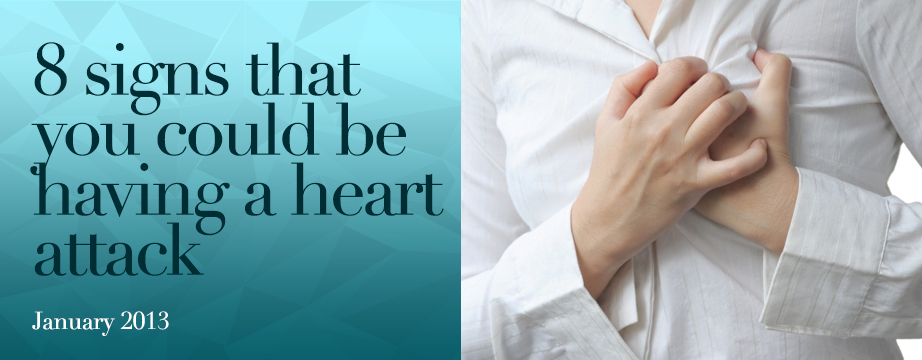|
| MYOCARDIAL INFARCTION, OR HEART ATTACK, OCCURS WHEN BLOOD FLOW TO A part of the heart is blocked for a long enough time that part of the heart muscle is damaged or dies. It is vital for someone who is suffering from a heart attack to seek help immediately as a heart attack can be life threatening. |
|
| Watch out for these eight signs of a heart attack: |
|
| 1. |
Central chest pain |
| Common descriptions of the pain offered by patients include “severe crushing”, “like a stone pushing against the chest”, “burning”, “pulling”, “choking” or “strangling”. More uncommon descriptions include “pricking”, “piercing” and “cutting”. |
|
|
| 2. |
Difficulty in breathing |
| This usually accompanies chest pain, but it could occur on its own. A heart attack causes the lungs to become congested and in its most severe form, acute pulmonary edema, there could be frothing at the mouth and the patient literally “chokes†to death on his own secretions. A less severe form of this symptom could occur while one is at rest or doing very minimal activities. |
|
|
| 3. |
Loss of consciousness (sudden collapse) |
| This is usually caused by an arrhythmia – ventricular tachycardia, ventricular fibrillation or asystole. To put it simply, either the heart “seizes†or “stopsâ€. Ventricular fibrillation or tachycardia is the cause of sudden cardiac death and could occur during exercise or even during sleep. This is the most common reason why professional athletes collapse during sports activities and also why people are found dead while sleeping. During a heart attack, the heart could also stop for a few seconds or slow down drastically enough to cause dizziness and loss of consciousness. In these cases, consciousness is regained when the heart starts beating again. |
|
|
| 4. |
Unexplained nausea or vomiting |
| This is a less common manifestation of a heart attack, which is mediated by the vagus nerves. This could occur alone, or with any of the other symptoms. |
|
|
| 5. |
Feeling of indigestion |
| The heart is supplied by the same nerves which supply the digestive system. Thus, some patients experience symptoms that mimic gastric or intestinal complaints. |
|
|
| 6. |
Heart palpitations |
| This could be caused by arrhythmia or simply the sensation of the heart pumping more forcefully than usual. |
|
|
| 7. |
Pain in the jaw, throat, left shoulder, inner part of the left arm or central upper abdomen below the ribcage |
| This is known as “referred pain†as pain from the heart is referred to areas that are supplied by nerves at the same spinal level, in this case, by the first thoracic nerve, or by the same autonomic nerves. |
|
|
| 8. |
Cold sweat |
| Sweating profusely in the absence of fever and in association with any of the other above symptoms could suggest that you are having a heart attack. It is an autonomic response to the stress associated with the heart attack. |
|
| If you suspect that you may be having a heart attack, call for help, or get someone to dial the emergency services number or drive you to the nearest hospital. (do not drive there on your own). If you are already seeing a cardiologist regularly, call and let him/her know that you are having these symptoms and that you are heading to the hospital. However, if the symptoms are very mild, consult a cardiologist as soon as possible to get some tests done. Remember that you should not ignore the symptoms of a heart attack nor self medicate without having consulted a doctor previously for the symptoms. In the case of heart matters, “Time is Muscleâ€! |
|
|

 DR RUTH KAM
DR RUTH KAM


